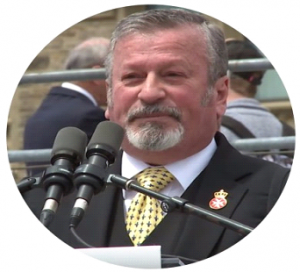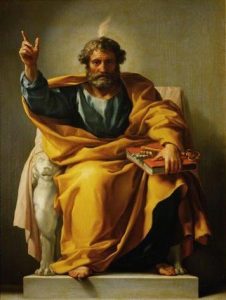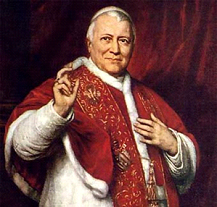 Smoke of Satan in The Church – Part 6
Smoke of Satan in The Church – Part 6
What good is it, my brothers, if someone says he has faith but does not have works? Can that faith save him? If a brother or sister has nothing to wear and has no food for the day, and one of you says to them, “Go in peace, keep warm, and eat well,” but you do not give them the necessities of the body, what good is it? So also faith of itself, if it does not have works, is dead. Indeed someone may say, “You have faith and I have works.” Demonstrate your faith to me without works, and I will demonstrate my faith to you from my works. You believe that God is one. You do well. Even the demons believe that and tremble. Do you want proof, you ignoramus, that faith without works is useless? Was not Abraham our father justified by works when he offered his son Isaac upon the altar? You see that faith was active along with his works, and faith was completed by the works. Thus the scripture was fulfilled that says, “Abraham believed God, and it was credited to him as righteousness,” and he was called “the friend of God.” See how a person is justified by works and not by faith alone. And in the same way, was not Rahab the harlot also justified by works when she welcomed the messengers and sent them out by a different route? For just as a body without a spirit is dead, so also faith without works is dead. (James 2:14-26)
On the evening of Thursday, the 29th of June 1972, the Solemnity of Saints Peter and Paul, in the presence of a considerable multitude of the faithful coming from every part of the world, the Holy Father celebrated the Mass and the beginning of the tenth year of his Pontificate as the successor of Saint Peter.
In His Homily referring to the situation of the Church today, the Holy Father affirms that he has a sense that “from some fissure the smoke of Satan has entered the temple of God.”
Many Catholic’s are concerned about climate change, global warming, CO2, or a shortage of water. Many would like to have free healthcare, others want subsidized flood insurance or some other form of government assistance to calm their worries, eliminate risk and most importantly, to eradicate the consequences of their own decisions and actions. They are willing to hire politicians holding positions contrary to the teachings of Catholic Church and basic Christian values in exchange for the promise of security.
The Catholic Church teaches that God oversees everything, so why worry about Global Warming?
If God wants to, He can change the climate at will. He is the one who created the world and designed everything.
In elementary school, children are taught that CO2 is the source of carbon for trees and other vegetation. Without CO2 there would be no trees to hug, no fruits and vegetables for vegans and there would be no meat either. CO2 is not a pollutant, it is one of many great gifts from God.
Then why are many Catholics falling into the devil’s trap? Wouldn’t it be enough to look at who is behind all these scares and promoting these theories? If we would take a look at the leaders of these movements, we can easily find out that majority of them are socialists, fascists, communist, promoters of abortion, gay marriage and other abominations. All of them hold views in opposition to the teachings of the Church.
If a Catholic by reading and studying a non-Catholic Bible or attending non-Catholic worship is opening himself to false teachings and is committing a sin against the faith, isn’t a Catholic similarly sinning by accepting the pagan world’s Global Warming theory?
In the past, Saints such as Athanasius, Ambrose, Augustine, Bonaventure, Alphonsus Liguori, Francis de Sales, Thomas Aquinas, John of the Cross and many others, who are recognized today as Doctors of the Church, guarded the purity of the Catholic Church’s teachings against heresies, manipulations and harmful influences of other religious and secular philosophies. Blessed Pope Pius IX issued the Syllabus of Errors in opposition to the high tide of intellectual movements of the nineteenth century which strove to sweep away the foundations of all human and Divine order. Pope St. Pius X continued this battle and ordered that all clerics take the Sacrorum antistitum, an oath against Modernism. Today significant percent, maybe even majority of Catholics accept the so called climate change as a serious problem, worthy of talking about and taking steps to stop it or at least slow it down. They are like little ants stuck between the platform of semi-truck and its 30-ton load, claiming that they can change the course of a moving semi-truck. It is ridiculous on one side and at the same time tragic because among many of the solutions to solve this “problem,” the driver of the truck, God, the only one who can do it, is omitted. For Christians, especially Catholics, the first reaction should be to get on knees and pray to God for mercy, knowledge of His will, and guides for action and making corrections in life on a personal and societal level, in order to please God and convince Him to change course. Rosary Crusades, Eucharistic processions and an increase of pious practices is the Catholic way in times of struggle and crisis.
Why are these alarmists like Al Gore and so many other so-called scientists, who proclaimed Global Cooling in 1970, Global Warming in 1990 and 2000, and finally Climate Change in 2018 as a serious problem, aren’t calling for national or global prayer. General Patton in December of 1944, during the Battle of the Bulge, ordered Chaplain O’Neill to write a prayer for good weather and to give a copy to each member of the Third Army and it worked.
Instead they are proposing carbon taxes, limitation of carbon emissions, unreliable and economically insufficient so-call alternative sources of energy like windmills and solar panels. The answer is simple, Satan is the architect of this scam. That is why there is no call for prayer, but rather a call to limit people’s rights, freedoms and ability to serve God and society according to their given talents. The plan is to separate people from God by creating false scares and promoting manmade solutions. Solutions which never solve problems, not in the past and not in the future. The government run retirement plan is not enough to live on, the war on poverty didn’t eliminate poverty, and people on welfare programs are not faring well. All of these so call solutions have side effects, slowly replacing God’s law with man’s law, faith in God with faith in government, turning Christians into Christians in name only and eventually to neopagans.
Cursed is the man who trusts in human beings, who makes flesh his strength, whose heart turns away from the Lord. (Jeremiah 17:5)
Why are we, as Catholics, falling into such obvious, easy to spot traps?
The answer is simple: “The Smoke of the devil is distorting the teachings of the Church.”
Know, love and serve.
Among Catholics attending regularly Sunday Mass, listening to reading from the Bible and sermons of priests, we will find some who are not satisfied, they want more. They are searching for God by studying Holy Scripture, religious books, attending lectures in order to get to know Him. They are praying more than others, creating a relationship with God, striving to love God. They are active in parishes, joining Catholic organizations. It seems like they are fulfilling all three requirements to know, love and serve God. What about rest of us, why are the majority of us not following a similar path?
The answer is in the prologue of the actual Catechism where we are reading “The life of man-to know and love God”
According to the Baltimore Catechism*, God made us to know Him, to love Him, and to serve Him in this world, and to be happy with Him forever in heaven.
In the new Catechism, serving God is included, but is not recognized as a crucial part of path too salvation. For example, in the Catechism of the Catholic Church it is written: “Called to beatitude but wounded by sin, man stands in need of salvation from God. Divine help comes to him in Christ through the law that guides him and the grace that sustains him:” (1949) Work out your own salvation with fear and trembling; for God is at work in you, both to will and to work for his good pleasure.1 Phil 2:12-13.”
Working out our own salvation- serving God is not a point, but is in the quote accompanying it from the First letter of St. Paul to Philippians.
As a consequence of small changes, the necessity of serving God is taken lightly and often ignored. Today the road to heaven generally speaking is: attending Mass on obligatory days, prayer, avoid breaking God’s Commandments, if you fail go to confession, and love God. We will be judge by the Love of God we are hearing.
Teachings of the Catholic Church are based on the Holy Bible and Apostolic tradition. For us Catholics, Holy Scripture should be the first source of guidance supplying us with information necessary to understand current events and to help recognize and follow the Will of God.
The Bible is full of examples showing benefits arising from serving God and the catastrophic consequences of failing to do so.
The best example is Adam. Adam was put in charge of the Garden of Eden: The LORD God then took the man and settled him in the Garden of Eden, to cultivate and care for it. (Genesis 2:15). As long as Adam was doing his job everything was fine, but when he lowered his guard, the snake (Satan) was able to persuade Eve to eat the forbidden fruit. Satan alone wouldn’t be able to persuade Adam to disobey God’s order, so he started with Eve and by committing a sin, she was enslaved to Satan as his servant. She was the one who convinced Adam, not Satan.
Adam failed, he failed to serve God, didn’t protect the Garden of Eden, didn’t watch over Eve, and finally disobeyed God. Consequently evil was invited to the world, since then an ocean of blood has been shed, and suffering and tears have replaced happiness and joy.
At the same time, we have countless inspiring examples of those who succeeded: Noah built the ark, seventy year old Abram (Abraham) left the land of his fathers, Moses led the Israelites out of Egypt; all the saints and the prophets of the Old Testament were doing the will of God. “Behold, I am the handmaid of the Lord. May it be done to me according to your word.” (Luke 1:38) Virgin Mary declared when the Archangel Gabriel announced to Her the Conception of Jesus.
Our Lord Jesus, son of God, God is saying in John 10:17-18 “This is why the Father loves me, because I lay down my life in order to take it up again. No one takes it from me, but I lay it down on my own. I have power to lay it down, and power to take it up again. This command I have received from my Father.”
In chapter 12:49 “because I did not speak on my own, but the Father who sent me commanded me what to say and speak.” and in Luke 22:42 “Father, if you are willing, take this cup away from me; still, not my will but yours be done.”
Both, Mary and Jesus were serving God the Father fulfilling His will. Apostles after receiving the Holy Spirit opened their locked doors, went outside and with the zeal of maniacs proclaimed the good news of the Gospel. We are often encouraged to look at and follow examples of Saints. All of them were people of action, they were warriors of God, each of them according to the need of their time and place. God, through the Apostles and Fathers of the Church, gave the Church shape, Doctors healed Her wounds, others converted nonbelievers, bringing back Her lost children. All of them were martyrs, those who shed their blood and those who did not; they sacrificed and surrendered their lives by heroically serving God.
Is serving God necessary for salvation?
Our Lord Jesus answered this question in Matthew 7:21- 23
“Not everyone who says to me, ‘Lord, Lord,’ will enter the kingdom of heaven, but only the one who does the will of my Father in heaven. Many will say to me on that day, o ‘Lord, Lord, did we not prophesy in your name? Did we not drive out demons in your name? Did we not do mighty deeds in your name?’ Then I will declare to them solemnly, ‘I never knew you. Depart from me, you evildoers.”
Each of us, according to our position and situation, is obligated to serve God. The ways of serving differ depending on whether one is a priest, politician, entrepreneur, teacher, factory worker, single, married, mother, father, etc. Each of us is walks a different path, facing different challenges and circumstances, in which we are supposed to act guided by the Holy Spirit. St. Paul in his first letter to the Corinthians 12:4-6 writes: “There are different kinds of spiritual gifts but the same Spirit; there are different forms of service but the same Lord; there are different workings but the same God who produces all of them in everyone.”
To receive the gifts of the Holy Spirit: wisdom, understanding, counsel, fortitude, knowledge, piety, and fear of the Lord, we must be willing to serve God, but not like those who would prophesy, drive out demons, do mighty deeds in the Lord’s name for their own glory and prestige. According to tradition, each Catholic, by receiving the sacrament of confirmation, becomes a soldier of Christ, but if somebody doesn’t want to cooperate with God’s grace, and doesn’t want to do the will of God, doesn’t want to serve God he becomes a deserter and shouldn’t expect the gifts of the Holy Spirit (who would give weapons to a deserter?) and consequently shouldn’t expect to reach eternal happiness in Heaven. “Do not give what is holy to dogs, or throw your pearls before swine, lest they trample them underfoot, and turn and tear you to pieces.” (Matthew 7:6)
The Jewish exorcists described in Acts 19:13-16 were acting in Jesus’s name too: Then some itinerant Jewish exorcists tried to invoke the name of the Lord Jesus over those with evil spirits, saying, “I adjure you by the Jesus whom Paul preaches.” When the seven sons of Sceva, a Jewish high priest, tried to do this, the evil spirit said to them in reply, “Jesus I recognize, Paul I know, but who are you?” The person with the evil spirit then sprang at them and subdued them all. He so overpowered them that they fled naked and wounded from that house.
To better understand the importance of serving God we have to return to the basic teachings of the Church, in the concise letter of St. Paul to the Ephesians 6:12: “For our struggle is not with flesh and blood but with the principalities, with the powers, with the world rulers of this present darkness, with the evil spirits in the high places.”
St. John -Baptiste-Marie Vianney in his sermon “We must expect temptation” is saying; “If you ask me what is the cause of our temptations, I shall tell you that it is the beauty and the great worth and importance of our souls which the Devil values and which he loves so much that he would consent to suffer two Hells, if necessary, if by so doing he could drag our souls into Hell.”
The reality is that every aspect of our lives, circumstances, considerations, decisions and every action we take are a part of spiritual warfare. Nothing is accidental or without its consequences. The term “spiritual warfare” comes from the fact that the Devil has no body, but the war he is imposing on us is not limited to our spirituality.
In a famous vison on October 13, 1884 which inspired Pope Leo XIII to compose the Prayer to St. Michael the Archangel, Satan approached the throne of God, boasting that he could destroy the Church. According to the Pope the Lord reminded him that his Church was imperishable. Satan then replied, “Grant me one century and more power over those who will serve me, and I will destroy it.” Our Lord granted him 100 years.
The Lord then revealed the events of the 20th century to the Pope. He saw wars, immorality, genocide and apostasy on a large scale.
The Devil, Satan, and Demons are spiritual creatures not limited by a physical body; they don’t need an open door to enter a room and there are no physical barriers which can stop them, they can go into our heads and our hearts and this way their actions can materialize. In the vision of Pope Leo XIII, Satan didn’t ask God for more power in general, he ask for more power over those who will serve him. St. Alphonsus Maria De Liguori, Doctor of the Church in his book “Preparation for Death” identifies that a servant of Satan is more dangerous then Satan himself. Today, like in the past, there are legions of servants of the Devil, a majority of them unaware, like those who crucified our Lord.
“Father, forgive them, they know not what they do.”
Only God can stop them, but we must, by our faith, our cooperation, and our service, give Him a reason to do so. We must cooperate with God’s grace.
Over two thousand years ago the words of our Lady, “Behold, I am the handmaid of the Lord. May it be done to me according to your word” became the key to the gates of Heaven. Jesus dying on the Cross opened them, and through our service we can keep those gates open for us, our children, and future generations.
We sin because of our human nature.
A majority of us Catholics have heard that people sin because of our human nature, our fallen nature wounded by original sin.
Everything, material or not material has characteristic elements and aspects which allow us to categorize them under common names. For example: a hammer is a tool. There are different hammers but all of them consist of a weighted “head” affixed to a long handle that is swung to deliver an impact to a small area of an object. We may say by that definition: a weighted “head” affixed to a long handle that is swung to deliver an impact to a small area of an object” describes the nature of this tool.
Every Catholic learns in catechism classes that we are a creation of God. Only God can create something from nothing or turn the dust of the ground into a man, not Charles Darwin. God gives us a body, He gives us our soul and our human nature, fundamental dispositions and traits of humans. It all comes from God and thus must be good; “God created mankind in his image… God looked at everything he had made and found it very good.” (Genesis 1:26-31)
Every catholic is obligated to accept the revelations of the Holy Bible, thus as good Catholics we must recognize that human nature is not to be blamed for our sins. Many will say that as a consequence of original sin, the sin of Adam and Eve, human nature is disturbed, wounded and for this reason causes us to sin.
In the Baltimore Catechism #3 lesson 14 on baptism it is written: “Baptism is a Sacrament which cleanses us from original sin, makes us Christians, children of God, and heirs of heaven.”
From the official updated Catechism of Catholic Church we are taught that: Through Baptism we are freed from sin and reborn as sons of God; we become members of Christ, are incorporated into the Church and made sharers in her mission: “Baptism is the sacrament of regeneration through water in the word.”(1213)
Many may remember the movie “The Passion of the Christ” by Mel Gibson, based on the private revelations of Bl. Anne Catherine Emmerich, the Roman Catholic Augustinian Canoness Regular of Windesheim, mystic, Marian visionary, ecstatic and stigmatist. On the way to Calvary Jesus says to His mother, Mary; “See mother I make all things new.”
On December 4th, 1976 our Lady told Fr. Stefano Gobbi “My son Jesus gave you life forever at the very hour when He was slain on the Cross. At the moment of His death, He set all of you free from death.”(To the Priests our Lady’s Beloved Sons)
On June 14th of the same year our Lord explaining the reason for Satan’s hatred of human nature to the Italian Roman Catholic priest Ottavio Michelini, who is considered to be a mystic, said: “from human nature sprang the root of Jesse; for human nature the Word was made flesh, associating his divine nature to the human, in the person of Christ. Human nature, mortally wounded, fallen under the tyranny of Satan, was delivered and elevated; it was restored to its primitive dignity, brutally trodden under foot and destroyed through deceit; “if you eat of this fruit you will be equal to God.” (Confidences of Jesus to a priest, book III Deliver us from the evil one)
The teachings of the Catholic Church, based on the Holy Bible and supported by personal revelations, says that a Catholic cannot blame human nature for the sins he commits.
God allows us to commit the same sins again and again to make us humble.
To expose the falsehood of this popular opinion circling among Catholics we have to go to the basic teachings on the Sacrament of Penance. The Sacrament of Penance in which the sins committed after Baptism are forgiven was established by our Lord Jesus after His resurrection during His appearance to the disciples, described in John 20:21-13: Jesus said to them again, “Peace be with you. As the Father has sent me, so I send you.” And when he had said this, he breathed on them and said to them, “Receive the Holy Spirit. Whose sins you forgive are forgiven them, and whose sins you retain are retained.”
The Sacrament of Penance removes sin and restores the friendship of God to the soul by means of the absolution of the priest. Absolution, the form of prayer or words the priest pronounces over us with an uplifted hand when he forgives the sins we have confessed, given while we are saying the Act of Contrition after receiving our Penance. The Sacrament of Penance gives us in our confessor a true friend, to whom we can go in all our trials and to whom we can confide our secrets with the hope of obtaining advice and relief. It shows the goodness of Our Lord, having once saved us through Baptism, He may have left us to perish if we committed a sin again.
At the same time, to receive the Sacrament of Penance worthily we must do five things: examine our conscience, have sorrow for our sins, make a firm resolution to never more to offend God, confess our sins to the priest, and accept the penance the priest gives us.
One of the requirements of worthily receiving the Sacrament of Penance is a firm resolution to never offend God, reflected in the words of Act of Contrition: I firmly resolve/ intend … to amend my life/to sin no more and to avoid the near occasions of sin.
Some of us may remember from Catechism classes that our aim as members of Christ’s Mystical Body is not merely to avoid mortal sin or venial sin, but to live a more abundant life given to us by Christ. For this reason, we should go to confession regularly, even if we have no mortal sin to confess. We should tell those venial sins for which we are sorry and which we are determined to avoid in the future. Then, during the time until our next confession, we should really work to overcome these sins. This way we are fulfilling the requirements of worthily receiving the Sacrament of Penance and our promises made in Act of Contrition.
Many sins which people tend to commit repeatedly come from bad habits, others from a lack of self-control. The enemy is trying to cancel our confession, to break our promises, and he will do whatever it takes to accomplish this task. Our job is to fight back, to get up after each fall and fight, we may lose this time, but we are learning how to win the next round. It is similar to computer games: to reach the next level we have to learn how to get past the previous, how to avoid traps and find safe passage. Humility is necessary to learn the truth and walk in truth to win in this war for the salvation of our souls.
A Human is the composite of soul and body in the unity of form and matter. This does not seem to be too different from other natural substances. What makes the difference is that the human soul has two faculties, the intellect and the will.
Human free will is the target and reason for so much accommodation. “Endowed with a spiritual soul, with intellect and with free will, the human person is from his very conception ordered to God and destined for eternal beatitude.” The Catechism of the Catholic Church (1711).
Satan, who before his rebellion was the masterwork of creation hates all men and Christians in particular. He is working hard to separate man from his Creator.
By removing the word serve from the purpose of man’s existence he is redirecting man’s priorities.
Blaming human nature for man’s sins he is shifting the responsibility from himself (the designer of every sin) on to God, the Creator of man’s nature.
The idea of God allowing us to repeatedly commit the same sins again and again to make us humble, allow him to stop man half-way in his spiritual struggle. Examine conscience, have sorrow for sins- humble yourself, confess sins to the priest, accept the penance which the priest gives- mission accomplish. What about a firm resolution to never offend God?
Conclusion
The Smoke of the devil is distorting the teachings of the Church in order to make Catholics lukewarm.
Pope St. Pius X, over a hundred years ago at the beatification ceremony for St. Joan of Arc, warned: “All the strength of Satan’s reign is due to the easygoing weakness of Catholics.”
In the book of Revelations 3:15-16 it is written “I know your works; I know that you are neither cold nor hot. I wish you were either cold or hot. So, because you are lukewarm, neither hot nor cold, I will spit you out of my mouth.”
Hot Saints of God of the past and those among us. Those on pedestals and those hidden in monasteries, holy hermits and holy Popes are inspiring for good.
Cold evildoers like Joseph Stalin, Adolf Hitler, Pol Pot and many others through their actions revealed the true nature and ugliness of their master, Satan and because of its contradiction to human nature were rejected.
The Lukewarm are the fifth column of Satan, working from within, promoting an easy-going lifestyle, salvation for nothing and Heaven’s for free. Discouraging people from following the examples of saints, “can’t fix the world” they say, and they cover up for evildoers: “by de-legalizing abortion you will put at risk the health and life of many women.”
Looking back at the history of different countries, we can see that when the Catholic Church and Christian values flourished, they brought about the greatest prosperity. Medieval ages were not evil like the enemies of Catholic Church suggest.
The Holy Inquisition, because its chief aim was to reconcile heretics to the Church, was much more tolerant and holy than courts in a majority of countries at that time and even today. The real number of victims, over the hundreds of years of its existence, can be compared to one slow day in a German concentration camps during WWII.
Crusaders were giving up comfortable and peaceful earthly lives to gain eternal life: spending a fortune on armor and equipment to defend people’s right to worship the one true God in the Catholic Church. We have to remember that the prophet Muhammad, the founder of Islam was born in the year 571 AD. Before him, in North Africa, Armenia, Syria and lands of entire Roman Empire Christianity was the leading religion. The number of saints and their lives should prove this to all of us.
Today we bear witness to a great evil conquering the world. Meekness for many is not accepting and following the Will of God, but rather an excuse to stand for nothing and do nothing. Discussions yes, exchanging opinion – yes, complaining – yes, action – forget about it.
In effect a false spirituality limited to good feelings, locked inside the walls of churches is replacing the Service of God.
“What is your opinion? A man had two sons. He came to the first and said, ‘Son, go out and work in the vineyard today.’ He said in reply, ‘I will not,’ but afterwards he changed his mind and went. The man came to the other son and gave the same order. He said in reply, ‘Yes, sir,’ but did not go. Which of the two did his father’s will?” They answered, “The first.” Jesus said to them, “Amen, I say to you, tax collectors and prostitutes are entering the kingdom of God before you.” (Matthew 21:28-31)
* A Catechism of Christian Doctrine, Prepared and Enjoined by Order of the Third Council of Baltimore, was the official national catechism for children in the United States of America, based on Robert Bellarmine’s 1614 Small Catechism. The first such catechism written for Catholics in North America, it was the standard Catholic school text in the country from 1885 to the late 1960s
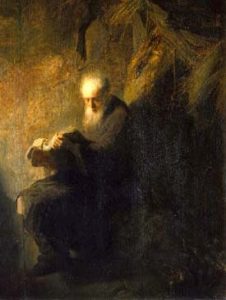 Smoke of Satan in the Church – Part 5
Smoke of Satan in the Church – Part 5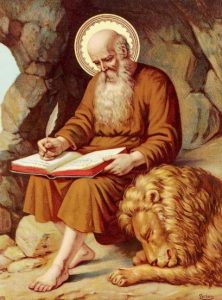 Smoke of Satan in the Church – Part 4
Smoke of Satan in the Church – Part 4 Smoke of Satan in the Church – Part 2
Smoke of Satan in the Church – Part 2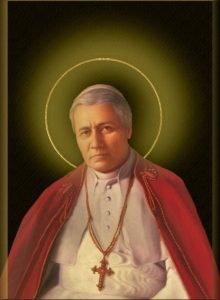 Smoke of Satan in the Church – Part 2
Smoke of Satan in the Church – Part 2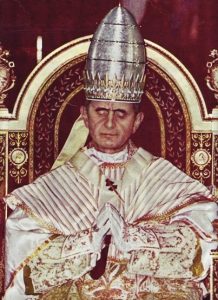
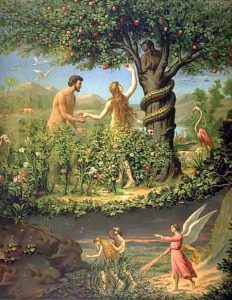 Satan and Sin
Satan and Sin